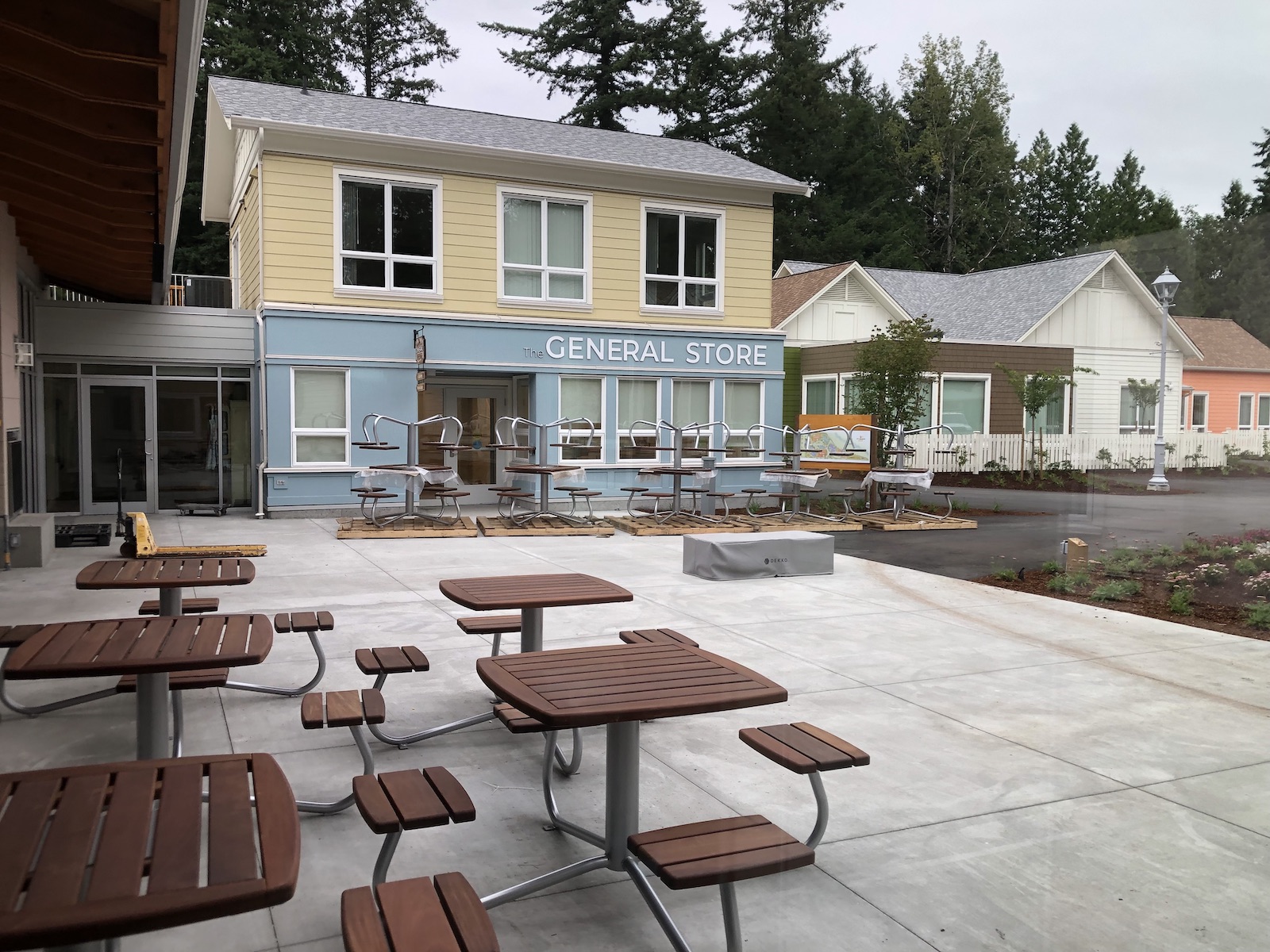By Michael Kary

On almost a weekly basis we hear news stories about seniors and their families who are facing challenges related to dementia, whether it is being able to access appropriate care or navigating through a very complex health care system. These challenges are likely going to continue as rates of dementia increase.
As outlined by the Canadian Institute for Health Information (CIHI), about 1-in-4 seniors age 85 or older have been diagnosed with dementia [1] and the number of Canadians living with dementia is expected to increase by over 65 percent over the next 15 years [2]. Dementia is a particularly pressing matter in long-term care as over 60 percent of residents have some form of dementia – an overall trend which has been steadily increasing over time [3]. In assisted living, the rates are also close to fifty percent while about one-third of those receiving home health care services in BC have been diagnosed dementia [4].
New Dementia Models (including dementia villages)
The steady and increasing levels of dementia have also resulted in providers examining the way they deliver or provide care to such populations, including the rise in popularity of new dementia care models. Among the most commonly discussed models, particularly in the media, is the dementia village. While the first dementia village was established in the Netherlands (DeHogeweyk) [5] in 2007, new villages are also being established across the world including in BC. For example, Providence Health Care plans to open up two such dementia villages in the near future [6] while in the summer of 2019 a private dementia village opened in the city of Langley [7]. The latter dementia village in Langley occupies five acres including a cluster of six “cottages” each designed for up to 12 residents linked by broad walkways to a barn and garden at one end and a reception building (with bistro and general store) at the other [8].
While the dementia village should be regarded as an innovative approach to improve dementia care, due to costs including property and other considerations (i.e. staffing, etc.), it may not be a realistic or feasible approach for most care homes. Not only in some cases can it be more costly – such as in the case in Langley Village where residents pay a base rate of $7,300 per month [9] – dementia villages risk becoming outdated as the population ages, as well as risks alienating people from different backgrounds. The “villages” are often built on the outskirts of towns, segregating people who may benefit more from feeling a sense of connection with their local communities [10].
Likewise, the concept of a dementia village also poses some other challenges, including whether it is ethical or even could be considered deceitful to create a false reality for those living with dementia [11]. Others, however, argue that it is justified including at times to mislead those living with dementia as a necessity or act of kindness [12]. This ethical dilemma, along with many other issues such as exploring how providers and other stakeholders can work together to improve the care of people living with dementia, will be the focus of the next Care to Chat. The event entitled Does it take a Village? Changing the Face of Dementia Care will be hosted by the BC Care Providers Association (BCCPA) in Vancouver, BC on March 6, 2020.
Creating dementia-friendly care environments
With increasing levels of dementia, it is important to look at creating living environments for seniors that are not only safe but also provide better quality of life. Namely, by creating a more dementia-friendly living environment. Over the past year, BCCPA and Alzheimer Society of B.C., in partnership with Simon Fraser University (SFU), have been exploring what makes a care environment dementia-friendly. As outlined in an article from 2018, this collaborative project has been examining what other jurisdictions in Canada and internationally have done, or are doing, to develop dementia-friendly criteria or guidelines in long-term care [13]. Along with presenting at the 2019 BCCPA Conference, the Alzheimer Society of B.C. and BCCPA in April 2019 hosted a forum event on this important initiative [14].
Later in 2020 the BCCPA, Alzheimer Society of B.C. and SFU are also planning to release a major paper outlining in detail some of the best practices for care homes to adopt in order to become more dementia-friendly. The report is intended to assist current and future care homes in using or implementing promising or best practices to become more dementia-friendly, focusing on two areas, namely: 1) the physical infrastructure or living environment and 2) staffing, including training and education.
As outlined in the forthcoming report, the physical infrastructure component involves creating environments that are distinctive, safe and familiar to seniors living with dementia. A 2017 study notes that supportive physical environments can have a number of positive effects on people living with dementia including helping people stay oriented, improving daily activities, promoting autonomy and meaningful activity, reducing anxiety, agitation and falls as well as providing better person-centred care [15].
Along with changes to the physical environment, another fundamental element of making care homes more dementia-friendly is looking at ways staff engage or interact with the people they are supporting. This can be achieved in a variety of ways including adopting a gentle persuasive approach (GPA) to dementia care or implementing new care models [16]. One common feature of these new models whether the dementia village or butterfly care home concept [17] is the idea of creating a more home-like setting with about 8 to 12 residents living together in household units. Recent literature has shown that people living with dementia experience better quality of care in home-like, clustered accommodation models [18].
In particular, home-like, clustered domestic models of care are associated with better quality of care, specifically in regards to providing access to the outdoors and flexibility of care [19]. Recent research from Australia has also found that home-like models, which consist of smaller groups of up to fifteen residents, are delivering better outcomes for a comparable cost [20]. For example, people living in home-like settings were less likely to be admitted to hospital or transferred to an emergency department and were 52 percent less likely to be prescribed a potentially inappropriate medication [21].
Does it take a Village?
The creation of new care models, including transforming the way staff interact with those with dementia, as well as redesigning physical environments into more home-like settings or developing new dementia villages, can be costly and perhaps prohibitive for many care homes. It is important, however, that even minor changes can still have a positive impact. This concept was discussed at the 2019 BCCPA Conference, where it was highlighted that even small changes or ‘baby steps’ can help move us forward in providing better dementia care. The idea of baby steps was also a focus of a 2019 webinar the BCCPA provided to the Newfoundland and Labrador Centre for Applied Health Research (NLCAHR) Research Exchange Group on Aging [22].
Another important element of providing dementia care will also be looking at better ways to assist seniors in navigating through the system, as well as coordinating their care. One such example to better assist seniors navigate through the system is First Link – a referral program designed to help newly diagnosed people living with dementia get the help they need as soon as possible [23]. A 2018 research study from the United States, also highlighted that a comprehensive, coordinated care program for people living with dementia and their caregivers can potentially decrease the likelihood that individuals may need to enter a nursing or long term home [24]. The research, published in the December 2018 JAMA Internal Medicine [25] analyzing the UCLA Alzheimer’s and Dementia Care Program, for example, found that patients enrolled in the program [26] reduced their risk of entering a nursing or long term care home by about 40 percent [27]. A more recent study also found that the UCLA program improves the mental and emotional health of patients including reducing behavioral problems and depression, and lowering distress of caregivers [28].
In summary, the Care to Chat entitled Does it take a Village? Changing the Face of Dementia Care will look at how providers can work together to provide better care for people living with dementia. Along with looking at some of the pros and cons of establishing new dementia care models (i.e. villages, butterfly care homes, etc.), including some of the financial and ethical challenges, this Care to Chat will also look at how even some small changes or “baby steps” (outlined in a soon-to-be-released Best Practice Guide) can lead to successes. Likewise, the Care to Chat panel consisting of experts from academia, care providers, health authorities and the Alzheimer Society of B.C. will look at ways to assist seniors, particularly those with dementia, in better navigating and coordinating their care.
END NOTES
[1] Canadian Institute for Health Information. Dementia in Canada. June 2018. Accessed at: https://www.cihi.ca/en/dementia-in-canada
[2] Canadian Institute for Health Information (CIHI). Health Care in Canada, 2011: A Focus on Seniors and Aging. Ottawa. November 2014. Accessed at: https://secure.cihi.ca/free_products/HCIC_2011_seniors_report_en.pdf.
[3] BC Ministry of Health. Residential Care Staffing Review. March 2017. Accessed at: http://www.health.gov.bc.ca/library/publications/year/2017/residential-care-staffing-review.pdf
[4] BC Office of the Seniors Advocate. Placement, Drugs and Therapy… We Can Do Better. April 2015. Accessed at: https://www.seniorsadvocatebc.ca/app/uploads/sites/4/2015/09/PlacementReport.pdf
[5] BCCPA. OP-ED: Exploring Dementia Villages and Other Care Models in Canada. 2015. Accessed at: http://safecarebc.ca/2015/10/08/op-ed-exploring-dementia-villages-and-other-care-models-in-canada/
[6] The Daily Scan. Providence advances seniors care commitment with plans for second dementia village. January 17, 2019. Accessed at: http://thedailyscan.providencehealthcare.org/2019/01/dementia-village/
[7] CTV News. Canada’s first ‘dementia village’ set to open its doors. May 28, 2019. Accessed at: https://bc.ctvnews.ca/canada-s-first-dementia-village-set-to-open-its-doors-1.4441535
[8] The Tyee. Is This Langley ‘Village’ the Future of Dementia Care? Crawford Kilian. August 15, 2019. Accessed at: https://thetyee.ca/Analysis/2019/08/15/Langley-Village-Dementia-Care/
[9] The Tyee. Is This Langley ‘Village’ the Future of Dementia Care? Crawford Kilian. August 15, 2019. Accessed at: https://thetyee.ca/Analysis/2019/08/15/Langley-Village-Dementia-Care/
[10] The Conversation. ‘Time travel’ as dementia care is spreading, but the future may be more powerful than the past. July 2019, 2019. Accessed at: https://theconversation.com/time-travel-as-dementia-care-is-spreading-but-the-future-may-be-more-powerful-than-the-past-120469202019%2
[11] Ozy. The Rise of Dementia Villages — The Happiest Places on Earth? July 27, 2017. Accessed at: https://www.ozy.com/fast-forward/the-rise-of-dementia-villages-the-happiest-places-on-earth/79270
[12] National Post. Matt Gurney: Sometimes it’s better to lie to loved ones who have Alzheimer’s. July 11, 2019. Accessed at: https://nationalpost.com/opinion/matt-gurney-sometimes-its-better-to-lie-to-loved-ones-who-have-alzheimers
[13] BCCPA. Creating Dementia-Friendly Care Homes in B.C. December 2018. Accessed at: https://bccare.ca/2018/12/creating-dementia-friendly-care-homes-in-b-c/
[14] BCCPA. BCCPA co-hosts Dementia-Friendly Care Home Forum with Alzheimer Society of B.C. April 2019. Accessed at: https://bccare.ca/2019/04/bccpa-co-hosts-dementia-friendly-care-home-forum-with-alzheimer-society-of-b-c/
[15] The Influence of the Physical Environment on Residents with Dementia in Long-Term Care Settings: A Review of the Empirical Literature. Gerontologist 2017, Vol 0, No. 0, 1-13. Habib Chaudhury, Heather Cooke et al. Accessed at: https://www.researchgate.net/publication/314514461_The_Influence_of_the_Physical_Environment_on_Residents_With_Dementia_in_Long-Term_Care_Settings_A_Review_of_the_Empirical_Literature
[16] Organizations such as Safe Care BC and the Alzheimer Society of B.C. currently offer courses based on the care approaches or techniques practiced in these models. In 2014, SafeCare BC and the Alzheimer Society of B.C. established the ‘Creating Connections: Working with People Living with Dementia’ workshop which has now been delivered to over 600 care providers who work with people with dementia. As part of the workshop care workers gain a better understand Alzheimer’s disease and other dementias, receive key tips for communication, and learn how to be creative in dealing with some of the behaviors common among people living with dementia. The information is also presented within the context of “person-centred care”. For further information see: https://bccare.ca/2015/01/dementia-care-workshop-creating-connections/ and https://bccare.ca/2016/06/safecare-bc-alzheimer-society-b-c-expand-agreement-offer-dementia-education/.
[17] BCCPA. The Butterfly Effect: Changing Dementia Care in British Columbia. October 18, 2017. Accessed at: https://bccare.ca/2017/10/the-butterfly-effect-changing-dementia-care-in-british-columbia/
[18] Aged Care Insite. Home-like model of care “a no brainer”: study reveals benefits. Dallas Bastian. June 2018. Accessed at: https://www.agedcareinsite.com.au/2018/06/home-like-model-of-care-a-no-brainer-study-reveals-benefits/
[19] International Journal for Quality in Health Care. Clustered domestic model of residential care is associated with better consumer rated quality of care. Emmanuel S. Gnanamanickam et. Al. August 2018. Accessed at: https://doi.org/10.1093/intqhc/mzy181
[20] Aged Care Insite. Home-like model of care “a no brainer”: study reveals benefits. Dallas Bastian. June 2018. Accessed at: https://www.agedcareinsite.com.au/2018/06/home-like-model-of-care-a-no-brainer-study-reveals-benefits/
[21] Medical Journal of Australia. Clustered domestic residential aged care in Australia: fewer hospitalizations and better quality of life. Suzanne M Dyer et al. June 2018. Accessed at: https://www.mja.com.au/journal/2018/208/10/clustered-domestic-residential-aged-care-australia-fewer-hospitalisations-and
[22] BCCPA. Power point presentation the Newfoundland & Labrador Centre for Applied Health Research (NLCAHR) Research Exchange Group on Aging. March 2019. New Care Models: Creating Dementia Friendly Environments in Long Term Care. Accessed at: https://www.nlcahr.mun.ca/Research_Exchange/BC_Dementia-Friendly_Care_032019.pdf
[23] Alzheimer Society of Canada. First Link® program. Accessed at: https://alzheimer.ca/en/Home/We-can-help/Resources/For-health-care-professionals/first-link
[24] Medical Xpress. Study shows dementia care program delays nursing home admissions, cuts Medicare costs. December 2018. Accessed at: https://medicalxpress.com/news/2018-12-dementia-nursing-home-admissions-medicare.html
[25] JAMA Internal Medicine. Health Care Utilization and Cost Outcomes of a Comprehensive Dementia Care Program for Medicare Beneficiaries. December 2018. Accessed at: https://jamanetwork.com/journals/jamainternalmedicine/article-abstract/2719196
[26] As part of the UCLA program people with dementia and their caregivers meet with a nurse practitioner (NP) specializing in dementia care for a 90-minute in-person assessment and then receive a personalized dementia care plan that addresses the medical, mental health and social needs of both people. The NPs also work collaboratively with the patient’s primary care provider and specialist physicians to implement the care plan, including adjustments as needs change over time. A total of 1,083 Medicare beneficiaries with dementia were enrolled in the program and were followed for three years. The study compared them to a similar group of patients living in the same ZIP codes who did not participate in the program. While there were differences for those going into long term care there were no differences between the two study groups in hospitalizations, emergency room visits or hospital readmissions.
[27] Medical Xpress. Study shows dementia care program delays nursing home admissions, cuts Medicare costs. December 2018. Accessed at: https://medicalxpress.com/news/2018-12-dementia-nursing-home-admissions-medicare.html
[28] UCLA. UCLA Newsroom. Dementia care program improves mental health of patients, caregivers. August 13, 2019. Accessed at: http://newsroom.ucla.edu/releases/dementia-care-program-improves-mental-health-patients-caregivers




